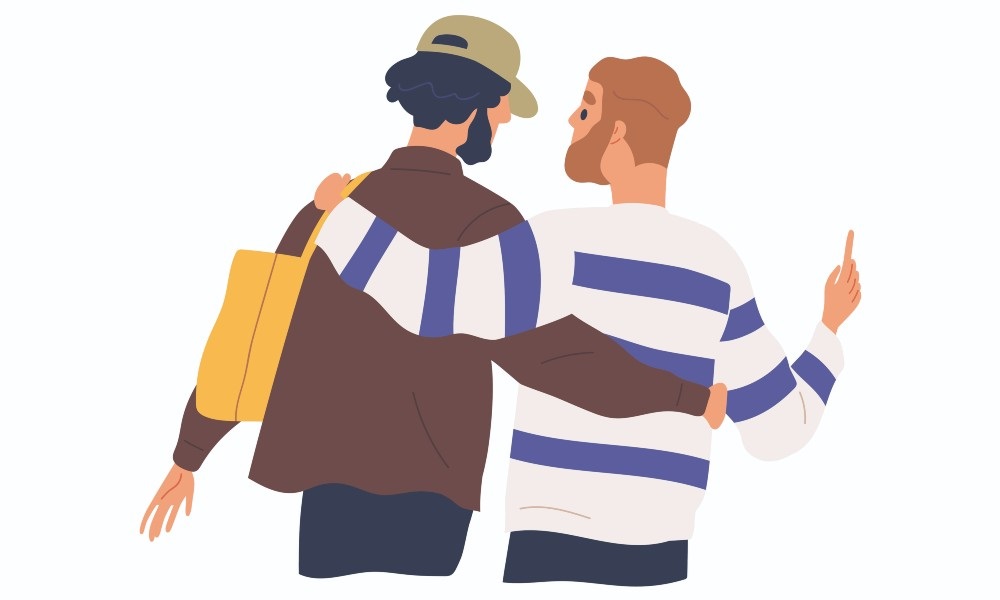What’s up, bro? Catching Up With Modern Male Friendships & Vulnerability
I’m a bros’ man. At one point, I envisioned creating a Best Man XI, if I were to marry traditionally. I love my bros in a way that Coach Beard loves Ted Lasso; like how Circuit loves Munna Bhai. Well into our 30s now, I’ve known some of them for more than two decades. We’ve gone from getting shit-faced drunk together to now sharing the same antidepressants (prescribed of course).
But having a long-standing group of close male friends who are not sociopaths with vested interests is alien to small-town families like mine. After all, no males in the previous generation of my family have had close male accomplices, or at least ones who we were ever introduced to, growing up. My dad, and the uncles, were tasked (or assumed it) to be family men — stoic, masculine, and harbouring the emotional quotient of the office stationery they carried around in their VIP briefcases. They were expected to do things by themselves. Even if they were hurting, a cry for help would be an attack on their Amitabh Bachchan-inspired machismo.

Other males were only competitors— Vinod Khanna-like rivals, who you couldn’t look in the eye. But millennials are doing better, aren’t we? Or so I thought, until I attended a male cousin’s pre-pandemic wedding. Out of the 500-odd guests, his friends/ classmates/flatmates could only fill one spot. Not that he didn’t have any growing up, just that he chose not to invite them. The biryani and kebabs kept me occupied, so I didn’t bother to ponder why. However, at another wedding not much later, I met a bunch of my former male schoolmates and somewhat understood my cousin’s predicament. In front of me were “friendships” that were frozen in time. Not in a great way, though. The bullies, now married with kids, were still preying on their victims, who were also married, by the way, and had families of their own. Putting slime in someone’s shoes might have been ‘funny’ at 14-years-old, but doubting what they packed in their pants in front of their significant other seems a bit much at age 30.
Some continue to take it while the others, like my cousin, snap out of it. But, truth be told, I’ve had my share of conflicts with my bros, too. Some have gone years without speaking to me; one shut me down because I might have been too intrusive during his heartbreak and the other just couldn’t acknowledge that he had gaslit me. We could’ve taken my cousin’s approach, but as things stand now, these two are still part of my Best Man XI, if/when that materialises. What changed? We talked. Not just to each other, but also to mental health professionals. A lot of our problems stemmed in gender binaries and childhood trauma. As we spent our teens preparing for competitive exams, being in touch with one’s emotions took the backseat. Before we knew it, student debts loomed large, and vices like expensive whisky et al drained our bank accounts. Some of us also decided to fight fascist regimes, which isn’t any less than a full-time commitment.
But thankfully, most of my bros prioritised self-awareness around the age 30-mark. Thankfully, it rubbed off on me too. It gave us enhanced vocabulary, which was limited to Bojack Horseman dialogues during our mid-20s. We created safer spaces, along with some tasteful banter of course, to drag each other forward in our Squid Games-esque existence. Not that we are the grand old men of millennial subsistence, but at least we have the balls to acknowledge our mistakes.
As for the others, I’ve made peace with severing ties with those who take vulnerability for weakness. Although PTSD from the bullying keeps popping up in therapy, it doesn’t affect me terribly anymore. And if this sounds emasculating to you, welcome to the era (or maybe my own echo chamber) of the emotional man. Masculinity is not the sole proprietor of the globetrotting studs from Bollywood’s Akhtar universe, and neither does it throb in the pants of Sonu-Titu’s manchildish archetypes. It’s evolving, and you better get on with it.
